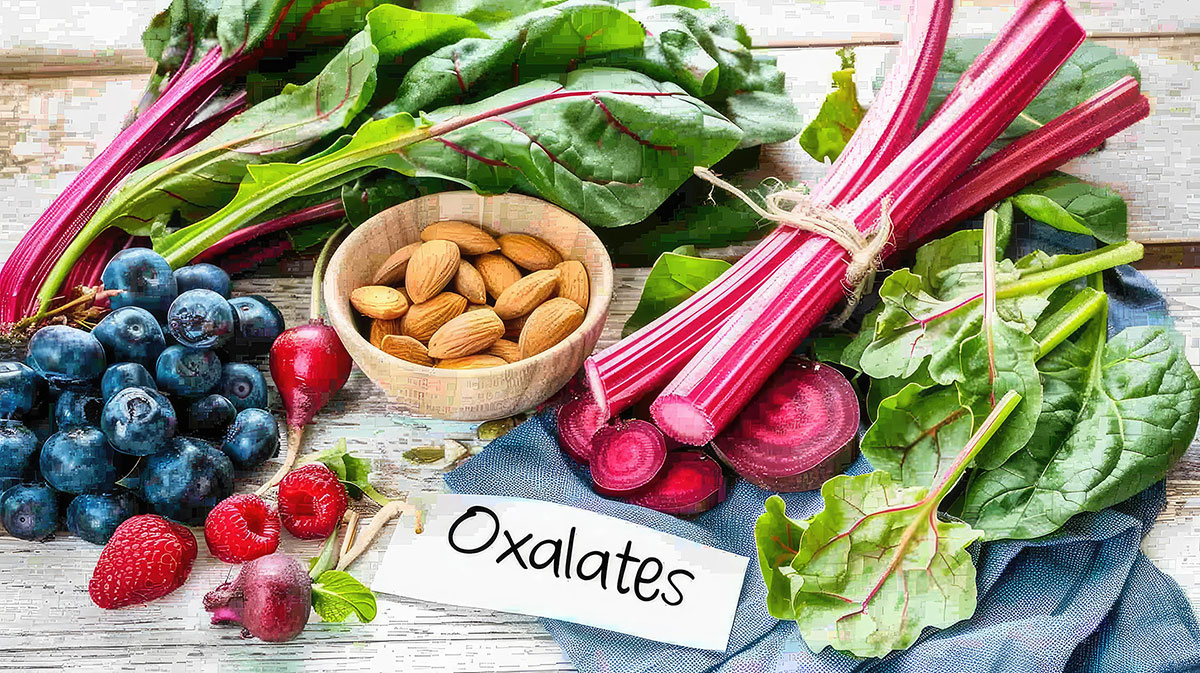Get a Free box of Gummies ($120 value) when you spend $200 or more. Now through Monday

If you are aware of the benefits of a low oxalate diet or have been advised to follow it by your healthcare provider, you might want to explore the science behind dietary oxalates. Oxalates can cause health problems when consumed in large amounts and are not effectively processed by the body.
This article examines the relationship between oxalates, our diet, and other factors influencing our ability to metabolize dietary oxalates. This information is general, so it is important to consult your healthcare professional for guidance on managing your health and well-being.
Oxalic acid, also known as oxalates, are natural compounds that are found in many plant foods, such as nuts, grains, vegetables, and fruits.1 Their chemical composition is made up of basic atoms of carbon and oxygen, yet this simple structure plays an important role in the plant’s self-protection. It’s fascinating, the way nature provides for its own! As seen in many plants, oxalates actually provide protection for the plant itself, by naturally deterring any insects or other pests from causing harm.2
People process food and its components, like dietary oxalates, for example, differently. Though some consider dietary oxalates harmful, it is essential to look at this more closely. Let’s examine the factors that affect how our bodies metabolize and utilize oxalates, along with when a low oxalate diet may be warranted.
How oxalates are metabolized by the body depends on the amount of oxalates that are consumed in a person’s diet. There are some factors that directly impact the metabolism and absorption of these compounds. It’s believed that approximately half of the oxalates that are metabolized and excreted in our urine are derived from our diets, while the other half is naturally made by our bodies.3
When there is an excessive oxalate accumulation in the body it can result in the formation of kidney stones and may lead to other health issues.3,5 It is essential to recognize that there is no definitive method for understanding the full impact of oxalates on our health due to the numerous factors involved.
Calcium in our diets or through supplementation may impact the amount of oxalates that are absorbed by our body. Not all oxalates are absorbed equally by the body, and outside factors such as cooking methods can also influence how much oxalates are metabolized and absorbed by our body. Since oxalates bind the mineral calcium, they then produce calcium oxalate crystals as a result and play a role in the development of kidney stones, since these calcium oxalate crystals are not soluble.1,5 Heredity also plays a role in the formation of kidney stones, and not all stones are a result of calcium oxalates.
The way our bodies handle certain compounds is interesting and important for our health. A key player in this process is a small bacterium found in the gut called Oxalobacter formigenes (O. formigenes). However, this bacterium may not be a resident in everyone’s gut microbiome and this may be due to a number of factors. Some studies suggest that various factors, including our diets, the use of certain medications including antibiotics, as well as outside influences may affect the presence and viability of O. formigenes in our gut.
This bacterium helps to break down oxalate through a process called oxalate decarboxylation. In this process, oxalate is changed into formate and carbon dioxide.5 By breaking down oxalate, it reduces the amount that can enter the bloodstream and may lower the chance of developing calcium oxalate kidney stones.5
This is beneficial, especially when an individual may be at risk of having an excessive amount of oxalates in their diet.
A low oxalate diet may be prescribed by your healthcare practitioner. Again, keep in mind that everyone has different health needs. For individuals with a history of kidney stones, they may be advised by their HCP to avoid certain high-oxalate foods.
A low oxalate diet may be necessary for people with a history of kidney stones or health issues that affect how the body processes oxalates, like inflammatory bowel disease or other gut-related issues. 1,2,3,5 Reducing foods high in oxalates and replacing them with low oxalate options is important, along with staying well-hydrated, especially by drinking water. Consuming low-oxalate foods can help lower oxalate levels excreted through urine. It is essential to remember that anyone considering a low oxalate diet should not make changes on their own. Following the advice of a healthcare provider is vital.
Some foods that are low in oxalates include the following.
In addition to focusing on adding low oxalate foods into your diet, you may be able to decrease or reduce oxalate absorption by soaking and cooking foods, such as some vegetables and legumes.1 Eating balanced meals is important for your overall health, but also to ensure that you consume an adequate amount of calcium-rich foods daily.
People should adjust their diets as recommended by their healthcare providers, especially by limiting or avoiding some high-oxalate foods. Though the lists may vary, here are some foods with a high oxalate content.1,5
When it comes to maintaining the long-term benefits and considerations of a low oxalate diet, you should always be under the supervision and advisement of your healthcare practitioner. Also, working with a Registered Dietitian (RD) can be key to helping you make simple adjustments in your diet, and help you become knowledgeable in identifying high oxalate foods and replacing them with lower alternatives, as seen on a low oxalate diet. You also want to ensure that you are adequately hydrated throughout the day.
If you have concerns regarding a low oxalate diet plan or have concerns regarding your gut health or other health conditions, it is important to have a candid discussion with your HCP.
*These statements have not been evaluated by the Food and Drug Administration. These products are not intended to diagnose, treat, cure, mitigate, or prevent any disease. Individual results may vary.

Ken Swartz, MS is the co-founder, Chairman Emeritus, and former Chief Science Officer at
C60 Power, a health and wellness company committed to delivering the highest quality Carbon 60 products available.
Ken earned a Master of Science degree from the University of Colorado at Denver and a Bachelor of Science in
Economics from Arizona State University.’